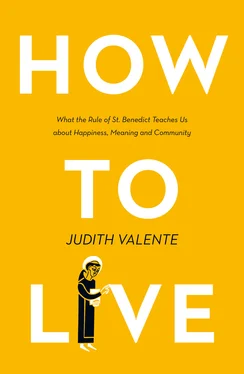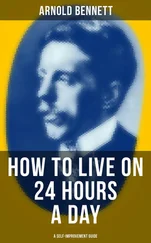Obedience is a blessing to be shown by all, not only to the prioress or abbot, but also to one another, since we know that it is by way of this obedience that we go to God.
—FROM CHAPTER 71, “MUTUAL OBEDIENCE”
Listening cracks open the door to another Benedictine concept from which most of us would rather run,—that of obedience. My first reaction is to recoil from the word. It conjures memories of being sent to my room or the principal’s office for not doing what I was told. Obedience comes from the Latin, oboedire, to give ear, to harken, to listen. The Benedictine writer Esther de Waal says that obedience moves us from our “contemporary obsession with the self,” and inclines us toward others. For those living in a monastery, obedience isn’t merely a rigor to endure. St. Benedict describes it as gift— a blessing to be shown by all . In doing so, he moves beyond the common understanding of the word as solely an authoritarian, top-down dynamic. He stresses instead mutual obedience , a horizontal relationship where careful listening and consideration is due to each member of the community from each member, as brothers and sisters. It is by this way of obedience, he says, that we go to God.
In our western civilization, this is a counter-cultural message. We admire antiheroes like Holden Caulfield in Catcher in the Rye, Randle McMurphy in One Flew Over the Cuckoo’s Nest , or Don Draper in Mad Men —outsiders who lurk at the margins, test the system. We honor trailblazers like Hildegard of Bingen, Eleanor Roosevelt, Dorothy Day, and others who refused the boundaries of traditional roles. But in their own way, those women were listeners too—hearers of a different song.
Most people in religious life have a story or two about the test of obedience. Usually it involves a seemingly insensitive superior who requires them to detour from a plan they had laid out for themselves. In her memoir Scarred by Struggle, Transformed by Hope, the Benedictine sister and spiritual teacher Joan Chittister tells of being accepted to a Masters in Fine Arts creative writing program at Iowa State University. At the time, she was teaching high school English, but dreamed of writing the kind of literature she was presenting in class. The Iowa State program threw her a lifeline. She recalls how after she received her acceptance letter, “Every day was suddenly easier than it had ever been before. Every moment was light … I could afford to treat the daily nature of grades and papers and class periods lovingly. There was suddenly no burden to it at all. Just finality. Just conclusion. Just gratitude.”
That would all end in a single hurried conversation. In a complete reversal, her prioress at the time—the same one who encouraged her to apply to the MFA program—told her the dream of studying creative writing would have to wait. She was needed to work as a third cook (yes, third cook!) at a summer camp run by her monastery. Sister Joan needed the kitchen job, her superior said, to deepen her humility.
“And so began one of the greatest struggles in my life,” Sister Joan writes. “I now wonder how I could have become the person I was meant to be if I had ever become the writer I thought Iowa State would make me.”
As is often the case, we can’t see beyond immediate disappointment. In the end, what seemed an insurmountable setback only deepened Sister Joan’s conviction that she was meant to write. She overcame the confines of her superior’s order by writing in her spare time with an even greater fervor. Having published dozens of books that have sold more than a million copies, she says she now looks back at that dark disappointment as the moment she realized no obstacle could deter her from her twin vocations, as a Benedictine and a writer.
Sister Irene Nowell of Mount St. Scholastica Monastery in Kansas is one of the world’s foremost Scripture scholars. But that is not the path she envisioned for herself. She arrived at her monastery an accomplished cellist. She expected to continue her musical studies in graduate school. Instead, her prioress informed her she would have to study German. “I said, ‘Mother, I don’t want a degree in German,’” Sister Irene recalls.
“She said, ‘That’s not the right answer.’ So I went off to get a degree in German.”
Many years later, Sister Irene asked to study Scripture at St. John’s University in Minnesota. “I got hooked on Scripture,” she says. “And do you know what they said? They told me the German degree was the best preparation I could have had because at that point so much of the research on Scripture had been written in German.”
Scripture—and music—became the defining themes of her life. She has written a translation of the Psalms for her community’s Liturgy of the Hours and was one of the scholars who worked on the English translation of the revised Catholic Bible as well as the St. John’s Bible , the first illuminated Bible in five hundred years, commissioned by St. John’s Abbey in Minnesota.
“So what the prioress did for me in forcing me to study German was really prophetic,” Sister Irene now says.
The stories of these two Benedictine women remind me that I have to listen not only to my inner voice, but to outside—and sometimes unwelcome—voices as well, like that of my colleague who warned that my strong opinions can sometimes be grating. Disappointment is often a useful teacher. Can I have the courage to listen to it, to discern where it might be leading me?
Let us open our eyes to the light that comes from God and our ears to the voice from the heavens that everyday calls out this charge: If you hear God’s voice today, harden not your hearts (Ps 95:8). And again, You that have ears to hear, listen to what the Spirit says. (Rv 2:7).
—FROM THE PROLOGUE
In listening with the ear of the heart, I’ve often discovered wisdom comes from what at first might seem an unlikely source. My father finished high school by attending night classes while working during the day. He earned his living as a truck driver. I, with my advanced degrees, often dismissed what he had to say. I know now that while my book learning might have given me knowledge, it didn’t necessarily make me wise. My father had a staple of sayings he was fond of repeating. One of them was, “When you’re hungry you eat, when you’re tired, you sleep.” That one used to draw some of the loudest guffaws. I guess I thought it was a stupidly self-evident statement. But there have been periods in my writing career when I have been so self-driven, I literally forgot to eat. I neglected to get enough sleep. At one point, when I was making an ample salary at one of the largest newspapers in the country, I landed in the hospital suffering from exhaustion and malnutrition—both self-inflicted wounds—and had to spend four months recuperating.
Suddenly my father’s little saying didn’t seem so stupid. It contained wisdom worthy of the Book of Proverbs. It’s something I still need to remind myself of, daily.
I experienced a similar lesson in listening when my husband and I led a retreat one Lent in rural Semmes, Alabama. Semmes is such a small community that when I asked for directions from the pastor of the church we would be visiting, he said, “Just roll into town on the main road, pass a cotton field and the Dollar General, and you can’t miss the church.”
On the first night of the retreat, I arrived early at the parish hall to collate the handouts, set up the CD player, and test the projector for the opening PowerPoint presentation. I became vaguely aware of an older woman flittering around the hall, sometimes talking to herself. I remember thinking, “I’d like to talk to this woman, just not now. I’m busy.”
Читать дальше












